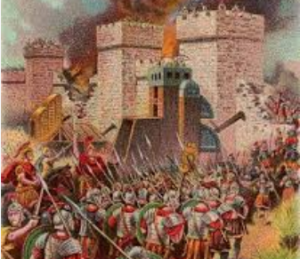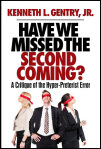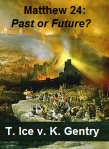OF PRETERISTS AND POSTMILLENNIALISTS (2)
 PMW 2023-056 by Kenneth L. Gentry, Jr.
PMW 2023-056 by Kenneth L. Gentry, Jr.
This is the second (and final) presentation of an interview conducted with me on preterism and postmillennialism.
Interviewer: Shifting to a related topic. Do preterist and non-preterist postmillennialists differ significantly in their reading of Matthew 24? Are there different interpretations of the two “days” even among preterists?
Gentry: Matthew 24 has been subjected to a fairly wide variety of interpretive approaches. Perhaps the more widely endorsed one holds that the Lord more or less jumbles together material on A.D. 70 and the Second Advent, in that A.D. 70 is a microcosmic precursor to the Second Advent. This view makes it difficult to sort out the verses in regard to which event the particular verses focus on. Among evangelical preterists two basic positions prevail: that 24:4–34 focus on A.D. 70 and 24:36ff focus on the Second Advent (this is my view, and the view presented by J. Marcellus Kik). The other view holds that all of Matthew 24–25 deals with A.D. 70.
Interviewer: Is that latter view — that all of Matthew 24 refers to A.D. 70 — what you have called “hyper-preterism,” or are there “regular” preterists that hold that interpretation of Matthew 24? How would their interpretation differ from the “hyper-preterist?”
Gentry: Although it is true that hyper-preterism holds that the entire Olivet Discourse speaks of A. D. 70, one’s position on that particular question does not necessarily lock him into the hyper-preterist heresy. The difference in interpretation at this specific point might be altogether negligible between an orthodox interpreter and a hyper-preterist. In fact, there are several verses where we find disagreement among orthodox interpreters and in which similarity to the hyper-preterist position may be noted. Where the fundamental differences would arise would be in other passages and on specific theological questions. If an interpreter is challenged to produce a passage supporting the Second Advent and he cannot produce one, then we have a serious problem. Or if he cannot affirm a physical resurrection at the end of history.
Have We Missed the Second Coming:
A Critique of the Hyper-preterist Error
by Ken Gentry
This book offers a brief introduction, summary, and critique of Hyper-preterism. Don’t let your church and Christian friends be blindfolded to this new error. To be forewarned is to be forearmed.
For more Christian educational materials: www.KennethGentry.com
Interviewer: What considerations in the text lead you to conclude that Jesus is distinguishing the two events in His prediction?
Gentry: Contextual evidence suggests that Christ is distinguishing two different comings. One coming is his coming upon Jerusalem in temporal judgment to end the old covenant era; the other is his coming at the Second Advent in final judgment to end history (24:36ff). These two “comings” are theologically related while historically distinct (and one of them speaks metaphorically of a “coming,” whereas the other speaks literally of a physical “coming”).
For example, by all appearance Matthew 24:34 functions as a concluding statement; it seems to end the preceding prophecy: “Truly I say to you, this generation will not pass away until all these things take place.” Consequently, the following events must relate to some episode not in “this generation.” That would suggest that all prophecies before verse 34 are to occur in “this generation.”
Interviewer: That seems to be borne out by the sense of urgency in the first section of the chapter.
Gentry: Yes. The character of the first section dramatically differs from that of the second. In the first section all is chaotic, laden with war and persecution. In the second section all appears tranquil, marrying and eating and drinking. What’s more, in the early section of Matthew 24 the time frame is short: “this generation.” In the following section (and through Matt. 25) the time frame is much longer: “But if that evil servant says in his heart, ‘My master is delaying his coming'” (Matt. 24:48). “But while the bridegroom was delayed, they all slumbered and slept” (Matt. 25:5). “After a long time the lord of those servants came and settled accounts with them” (Matt. 25:19). It is the very delay of the coming that tempts the church to forsake her watchfulness.
Interviewer: Many interpreters (of differing schools) lay great emphasis on the “signs” of the coming described in this passage. Can you comment on their significance?
Gentry: Before verse 34 Christ mentions signs pointing to the A.D. 70 coming: “wars and rumors of wars” (v. 6), “famines and earthquakes” (v. 7), “false prophets” (v. 11), and so forth. Accordingly, we may know the time of its approach; it is a predictable event. That’s Jesus whole point — be aware so you can act when the season of final danger is upon Jerusalem. Christ urges flight from the area (Matt. 24:16-20), clearly implying there will be time to flee.
On the other hand, after verse 34 signs are replaced by elements of surprise, indicating the coming in that section is unknown and therefore unpredictable: “they did not understand” (v. 39), “you do not know” (v. 42), “if the head of the house had known” (v. 43), “coming at an hour when you do not think He will” (v. 44), “he does not expect him” (v. 50), and “you do not know” (25:13). There is no warning — no opportunity for flight — for there can be no escape from that “day.” All befalls men suddenly (Matt. 24:48-51).
 Great Tribulation: Past or Future?
Great Tribulation: Past or Future?
(Thomas Ice v. Ken Gentry)
Debate book on the nature and timing of the great tribulation. Both sides thoroughly cover the evidence they deem necessary, then interact with each other.
See more study materials at: www.KennethGentry.com
Another interesting point is that even Christ Himself does not claim to know the time of the Second Advent (v. 36). Yet in the earlier section He clearly knows the time of the A.D. 70 judgment, for he tells his disciples that certain signs may come but “the end is not yet” (v. 6). He also tells them these things will certainly happen in “this generation.”
Interviewer: Thank you so much, Dr. Gentry, for answering our questions. I’m sure our readers have been piqued with an appetite to study these questions in more depth. If they do, they may consult you comprehensive exposition of biblical postmillennialism, He Shall Have Dominion.

Kenneth L. Gentry Jr.'s Blog
- Kenneth L. Gentry Jr.'s profile
- 85 followers



